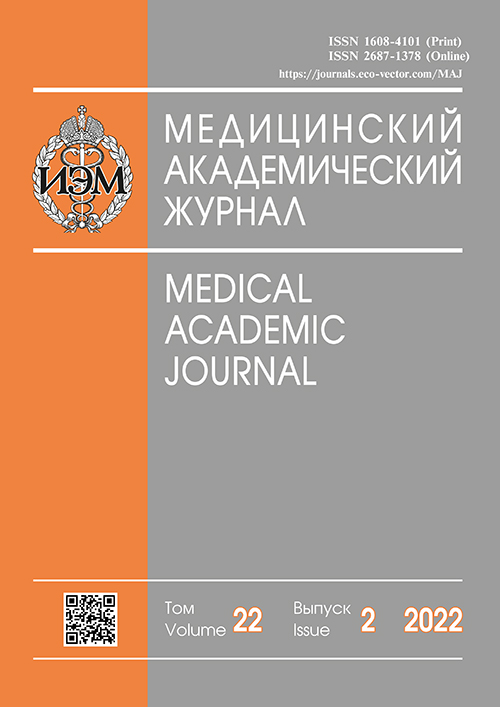Влияние пептидов SARS-CoV-2 на активацию NK-клеток человека
- Авторы: Устюжанина М.О.1,2, Британова О.В.1, Коваленко Е.И.1
-
Учреждения:
- Институт биоорганической химии им. академиков М.М. Шемякина и Ю.А. Овчинникова, РАН
- Сколковский институт науки и технологий
- Выпуск: Том 22, № 2 (2022)
- Страницы: 261-268
- Раздел: Материалы конференции
- Статья опубликована: 06.11.2022
- URL: https://journals.eco-vector.com/MAJ/article/view/108517
- DOI: https://doi.org/10.17816/MAJ108517
- ID: 108517
Цитировать
Полный текст
Аннотация
Обоснование. NK-клетки, наряду с Т-лимфоцитами, обладают высокой противовирусной активностью. Исследование вклада NK-клеток в борьбу с инфекцией SARS-CoV-2 может способствовать разработке надлежащего лечения COVID-19. Иммунный ответ NK-клеток, обеспечиваемый совокупностью сигналов от активирующих и ингибирующих рецепторов, ранее считался неспецифическим. В настоящее время показано существование определенных субпопуляций антиген-специфических, или адаптивных, NK-клеток.
Цель — оценить функциональный ответ NK-клеток, индуцированный пептидами вируса SARS-CoV-2.
Материалы и методы. Функциональный ответ NK-клеток на пептиды SARS-CoV-2 определяли по их способности к дегрануляции (поверхностной экспрессии CD107a), продукции интерферона гамма (IFNγ) и по степени активации (уровню экспрессии HLA-DR). В исследовании участвовали переболевшие COVID-19 добровольцы, как контроль использовали иммунные клетки здорового добровольца, не имевшего SARS-CoV-2-специфических антител.
Результаты. В отличие от NK-клеток не болевшего COVID-19 донора, NK-клетки от перенесших COVID-19 демонстрировали более высокий, по сравнению с контрольными образцами, уровень продукции IFNγ в ответ на пептиды SARS-CoV-2. Уровень дегрануляции NK-клеток от ранее инфицированных SARS-CoV-2 индивидов был выше, чем в соответствующем контроле. Доля активированных NK-клеток, полученных от переболевших участников исследования, оказалась так же выше в образцах, стимулированных пептидами SARS-CoV-2.
Заключение. Нами продемонстрирована активация NK-клеток, полученных от ранее переболевших COVID-19, в ответ на пептидные антигены SARS-CoV-2 в культурах периферических мононуклеаров in vitro. Данное исследование открывает возможность для последующего поиска и изучения антиген-специфических NK-клеток при заболевании COVID-19. Использование таких клеток может помочь в создании улучшенных методов лечения инфекции SARS-CoV-2.
Ключевые слова
Полный текст
Об авторах
Мария Олеговна Устюжанина
Институт биоорганической химии им. академиков М.М. Шемякина и Ю.А. Овчинникова, РАН; Сколковский институт науки и технологий
Автор, ответственный за переписку.
Email: mashaust1397@gmail.com
ORCID iD: 0000-0003-3378-6508
аспирант Центра наук о жизни; инженер
Россия, Москва; МоскваОльга Владимировна Британова
Институт биоорганической химии им. академиков М.М. Шемякина и Ю.А. Овчинникова, РАН
Email: olbritan@gmail.com
ORCID iD: 0000-0002-6295-1392
канд. биол. наук, старший научный сотрудник
Россия, МоскваЕлена Ивановна Коваленко
Институт биоорганической химии им. академиков М.М. Шемякина и Ю.А. Овчинникова, РАН
Email: lenkovalen@mail.ru
ORCID iD: 0000-0001-8119-8247
SPIN-код: 2359-7599
Scopus Author ID: 7102778244
ResearcherId: S-2086-2016
канд. биол. наук, старший научный сотрудник
Россия, МоскваСписок литературы
- Sivori S., Vacca P., Del Zotto G. et al. Human NK cells: surface receptors, inhibitory checkpoints, and translational applications // Cell. Mol. Immunol. 2019. Vol. 16, No. 5. P. 430–441. doi: 10.1038/s41423-019-0206-4
- Paust S., von Andrian U.H. Natural killer cell memory // Nat. Immunol. 2011. Vol. 12, No. 6. P. 500–508. doi: 10.1038/ni.2032
- Gumá M., Budt M., Sáez A. et al. Expansion of CD94/NKG2C+ NK cells in response to human cytomegalovirus-infected fibroblasts // Blood. 2006. Vol. 107, No. 9. P. 3624–3631. doi: 10.1182/BLOOD-2005-09-3682
- Hammer Q., Rückert T., Borst E.M. et al. Peptide-specific recognition of human cytomegalovirus strains controls adaptive natural killer cells article // Nat. Immunol. 2018. Vol. 19. P. 453–463. doi: 10.1038/S41590-018-0082-6
- Kovalenko E.I., Streltsova M.A., Kanevskiy L.M. et al. Identification of human memory-like NK cells // Curr. Protoc. Cytom. 2017. Vol. 79. P. 9.50.1–9.50.11. doi: 10.1002/CPCY.13
- Wijaya R.S., Read S.A., Truong N.R. et al. HBV vaccination and HBV infection induces HBV-specific natural killer cell memory // Gut. 2021. Vol. 70, No. 2. P. 357–369. doi: 10.1136/GUTJNL-2019-319252
- Maucourant C., Filipovic I., Ponzetta A. et al. Natural killer cell immunotypes related to COVID-19 disease severity // Sci. Immunol. 2020. Vol. 5, No. 50. P. eabd6832. doi: 10.1126/SCIIMMUNOL.ABD6832
Дополнительные файлы








